30th Anniversary of ‘One Love’
Exactly 30 years ago, on October 4th, 1993, the release of One Love single, one of the most iconic singles in the history of The Prodigy, took place. This release marked a significant step forward for the band, departing from the usual rave sound that Liam had previously produced and ushering in a new stage in the band’s creative development. Today, in honor of the anniversary, we have decided to revisit some of the events leading up to the single’s release, as well as other less obvious facts from that period.
To begin with, ’93 was a turning point for the band. The rave culture started to fade away, the US tour didn’t work out the way guys would have liked, and Liam started looking for new directions in his work. We wrote about it in detail in our article dedicated to the live shows of ’93 – https://theprodi.gy/live1993/
Inspired by German techno, as well as industrial and some alternative rock, Liam began a gradual shift towards a heavier sound. The first tracks of this new wave, oddly enough, were Liam’s remixes of other artists. During ’93, remixes for artists such as Front 242, Jesus Jones, The Magi & Emanation were released. We also have a separate article about all these remixes – https://theprodi.gy/1993remixes/
But it’s important to note that partly thanks to the remix of The Magi & Emanation’s Everybody Say Love the single ‘One Love’ was born. For instance, the main sample featuring the Arabic chant that sounds like the phrase “one love” was taken from the ‘Everybody Say Love’ remix pack.
- Sample: vocals (‘allah’)
- Sample source: The Magi & Emanation – Everybody Say Love (Radio Mix) [Everybody Say Love, 1993]
- Original source: Zero-G – Datafile One [1991] – Track 24
- Note: Since Liam made a remix of ‘Everybody Say Love’, it’s very likely that he used the sample from the multitrack. And no, the guy isn’t singing ‘one love’, even though it sounds similar to it.
Moreover, the b-side Rhythm Of Life of the single is, in fact, the first version of the remix of ‘Everybody Say Love,’ which the label management that released The Magi & Emanation found too heavy. They requested another version, which was subsequently released. We also discussed it in detail in our article about ’93 remixes.
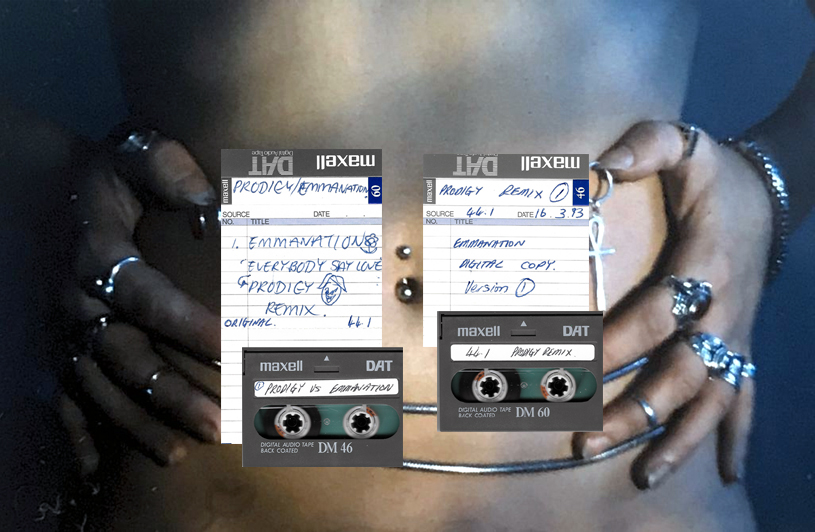
- Sample: vocals (‘rhythm of life’ & ‘your mind’)
- Sample source: The Magi & Emanation – Everybody Say Love (Radio Mix) [Everybody Say Love, 1993]
- Note: Liam made a remix of ‘Everybody Say Love’ and had all the stems.
- Sample: scream
- Sample source: The Magi & Emanation – Everybody Say Love (Radio Mix) [Everybody Say Love, 1993]
- Original source: Led Zeppelin – Whole Lotta Love [Led Zeppelin II, 1969]
- Note: Since Liam made a remix of ‘Everybody Say Love’, it’s very likely that he used the sample from the multitrack, not from the original source.
- Sample: synth
- Sample source: The Magi & Emanation – Everybody Say Love (Radio Mix) [Everybody Say Love, 1993]
- Also can be found in: The Magi & Emanation – Everybody Say Love (The Prodigy Re-Mix) [Everybody Say Love, 1993]
The same fact can be called one of the reasons why ‘Rhythm Of Life’ is missing on the legendary vinyl whitelabel called Earthbound.
Recall that Liam originally released the single on vinyl white-labels called ‘Earthbound 1’ and ‘Earthbound 2’. Legend has it that the idea was to conduct a sort of ‘blind-test’ among DJs, especially those who viewed the band negatively due to their success and commercialization. According to Martin Roach, who mentioned this case in his book, some music magazines even recognized this release as the best whitelabel of the year. Many DJs immediately embraced it and played it relentlessly. However, after the official release of the single, when everybody knew that it was The Prodigy, they stopped playing it. Or something along those lines.
Martin Roach in “Electronic Punks: The Official Story” book: During the summer of 1993 there was a promotional white label hard house tune circulating around the underground scene by a band calling themselves Earthbound, with two versions available. The record arrived cheaply packaged and with someone’s home address hastily scribbled on the label. Despite the spartan packaging, reactions to these records were very enthusiastic, with all the major DJs of note picking up on them, and crowd reactions were similarly positive. One dance magazine even went as far as to say, “This is the best white label we have received this year”. Clearly, Earthbound was a new act with enormous potential. There was much discussion about who Earthbound were, yet no-one knew or guessed. When the writer of these tracks was finally made known to the public, there was much consternation by the underground scene snobs who had derided The Prodigy for many months because of their commercial success. The record they were now hailing as the year’s best white label was in fact a product of Liam Howlett’s very own Earthbound studios, and the tracks were from the forthcoming release by The Prodigy.
After studying house, techno, breakbeat, and rave mixes in general of that period, we can confidently state that tracks from the single ‘One Love/Earthbound’ were neither more nor less common than other well-known tracks of that era. There may have been isolated cases with local DJs, but as a general trend within the mixes of those years, such a pattern is not observed. Moreover, ‘One Love’ had been a regular feature in the band’s live performances since May ’93, while the ‘Earthbound’ whitelabel was released only in August, just a month and a half before its official release. It’s highly unlikely that this went unnoticed by renowned DJs (who often performed at the same music events as the band), music journalists, and other individuals in these circles. Also Liam himself had mentioned the title of the upcoming single numerous times in the media months before its release. Therefore, the entire ‘Earthbound’ phenomenon appears to have been a relatively small-scale promotion targeting local DJs, which after the release of the single was pretty well blown up in the media and other interviews and books about the band to the scale of the whole UK.
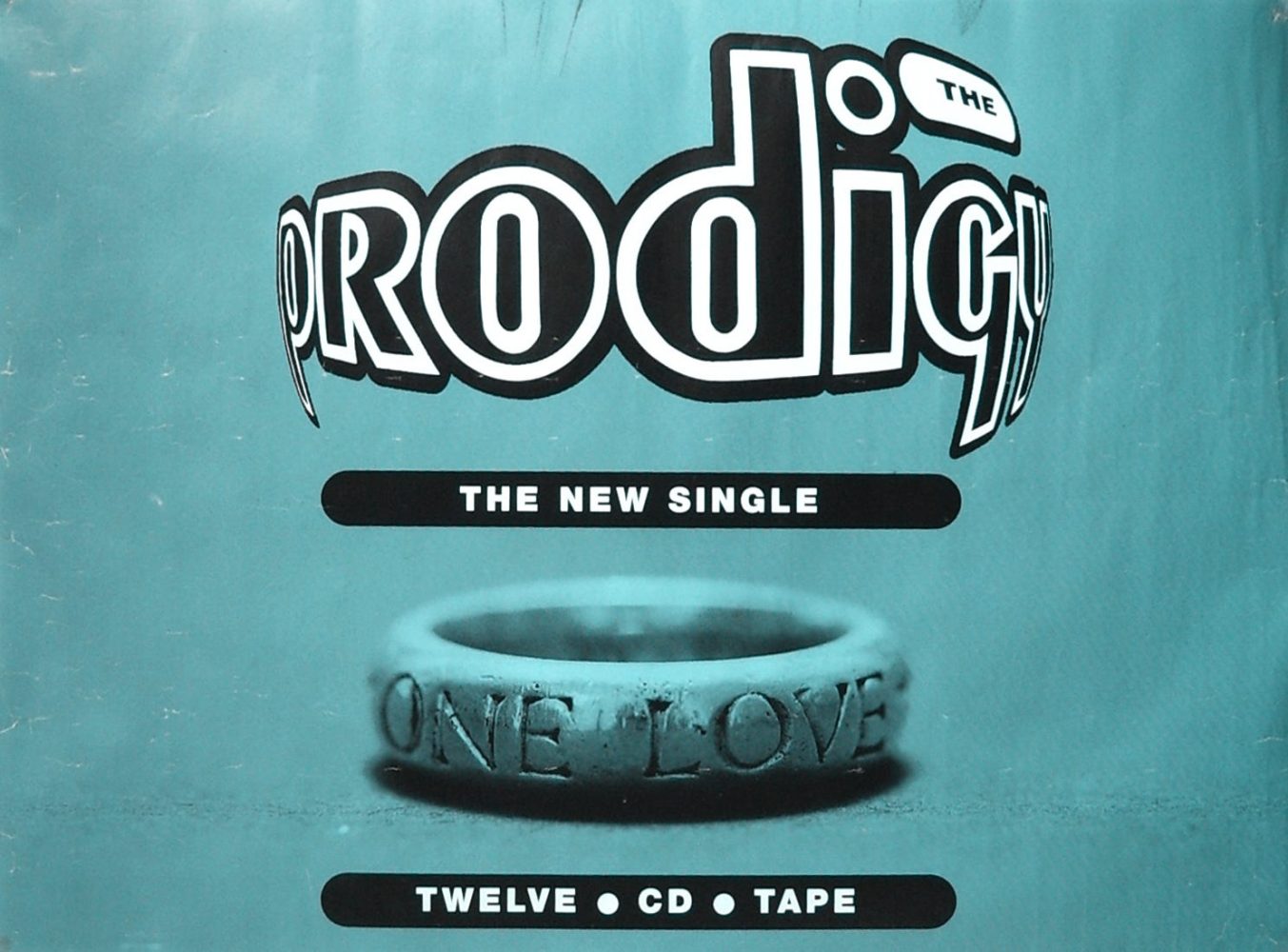
Upon its official release, the single was well received by the public and music critics. It was made available on audio cassette, CD, and vinyl formats, featuring the original mixes of ‘One Love’, ‘Rhythm Of Life’, ‘Full Throttle’ and a remix of the title track by British producer Johnny L.
The single achieved significant success, reaching number eight on the national charts, signifying that the band was evolving and leaving behind the era of ‘kids rave.’ In Liam’s own words, ‘One Love’ became “as quite a big jump” for the band. It was a more “house” track not typical of The Prodigy, it had less of a breakbeat, and that could have lost all the people who had previously followed band for the breakbeat element.
Liam to Martin Roach: “In a way, the whole scene at that point was confused, unsure, and as such was splitting up into various categories, with one set of DJs going one way and others going elsewhere. I didn’t want to get involved in all the internal politics, because that would have restricted me creatively, I would have been too limited. So ‘One ove’ came from that. With the more typical Prodigy ‘Full Throttle’ and the B-side incorporating the Johnny L mixes, which were more German techno with a touch of breakbeat, it was still a hard record.”

Liam and Leeroy in interview to Nite-FLite (01/08/93): “GOT ANY NEW TRACKS COMING OUT?”
Liam: “We’ve got one coming out in a couple of weeks, it’s a bit different. The A side ‘One Love’ I’d more of a ‘Four to the Flour’ hard house but fast.”
Leeroy: It’s good for the DJs cos they can play it fast or slow and it comes out alright.”
In general, the main tracks on the single, both the original and the remix, leaned towards a more European sound, with a focus on 4/4 house music. However, Elektra, the label that released The Prodigy in the US, accused the track of being too extreme and refused to release the single, despite the track being one of the most accessible since ‘Experience’. The label had previously insisted that Liam re-record his tracks specifically for the US market, making them simpler and more accessible.
So the single was not released in the US. This partly explains the difference between the versions of Full Throttle on this single and the later version on the album. The main difference is the title vocal sample from the Star Wars movie, which was actually borrowed from Ultramagnetic MC’s – Break North.
- Sample: vocals (‘we’re going in full throttle’)
- Sample source: Ultramagnetic MC’s – Break North [Critical Beatdown, 1988]
- Original source: Star Wars: Episode IV – A New Hope [1977]
In the single version of the track, it sounds as intended, but in the album version, this sample played in reverse (backwards) to avoid copyright problems. In the U.S., it was already much stricter in those years, so if the single was released in the U.S., the single version would probably have been edited as well.
A similar case would happen a couple of years later with The Chemical Brothers’ remix of Voodoo People, which was released in the US on the Mute label.
In addition to the main sample, the tracks also differ in length. The album version is slightly shorter than the single version. The reason is that Liam was so involved in writing the second album that he forgot that the CD format has a limit of 79 minutes. In addition to ‘Full Throttle,’ ‘One Love’ was also shortened. On the album was simply a shortened edit-version of the single, which is the only such case in the band’s history. According to Liam himself, he had plans to release some other version of ‘One Love’ on the album.
Liam to Martin Roach: “The only thing I regret is that I could have put a different version of ‘One Love’ on there, but there was just no time.”
Whether it was the full-length of original mix from the single – 5:55 or a slightly shortened version of the original mix to 5:25, which was released on 2005’s ‘Their Law: The Singles’, is unknown. It’s quite possible that the plan was to release a more breakbeat version of the ’94 on the album, which was regularly played live from the ‘Jilted Generation’ tour through mid-’95.
As many of you know, two years ago we restored this version!
The decision to shorten ‘One Love’ for the album was likely influenced by the fact that, unlike the other tracks on the album, ‘One Love’ had already been released almost a year before the album and was already well known to the public. As a result, the edited version became the most familiar to the masses. The full 5:55 version of the original mix remained a luxury for vinyl music enthusiasts and DJs, as it was never officially released anywhere else except in the vinyl edition of the single.
The exception was a rare Japanese edition of the single on a 3″ CD. During that time, the band’s releases in Japan were handled by the Avex Trax label. To be more precise, prior to the release of ‘One Love’, they label only released the album ‘Experience’. ‘One Love’ became the first single released in Japan. And it’s happened about six months after its initial release, in 1994. This Japanese edition of the single had different content from the classic edition, featuring no B-sides but instead including three versions of the title track: Edit, Johnny L Remix, and the Original Mix 5:55 (in digital format!).
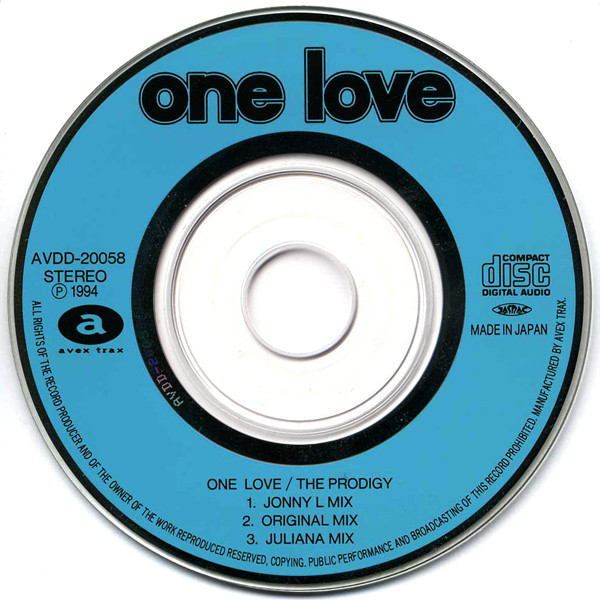
The release also differed in the fact that the notorious “edit” here was renamed to a certain Juliana Mix, and on the cover of the single, there were photos of four individuals who had nothing to do with the band. The reason behind this was that the Avex Trax label decided to promote Juliana’s Tokyo club through this release, and the individuals pictured on the cover were resident DJs of this club. Whether the original intention was to promote the club through the single or if, conversely, due to the popularity of the local famous club in Tokyo, they decided to promote the single, is unknown. However, looking back on it years later, it all seems quite amusing. 🙂
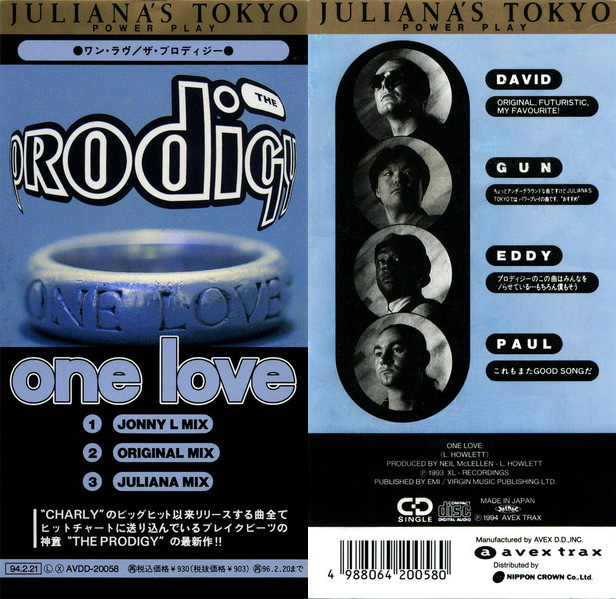
Perhaps the most significant visual event was the music video for the track ‘One Love’, which was radically different from anything the band had done before. All the previous videos were mostly one-type dance promos, with almost no plot or band participation, except for the actual dance moves, which the band had grown tired of. But for this clip, brand new computer graphics by CGI-designers from the USA were used. The team created a magnificent Aztec-style city, a visual feast of high-tech graphics and computer reality that accompanied the groundbreaking composition. Their appearance in the clip was limited to a few computer-simulated dance moves, with Keith appearing for no more than three seconds at the very end of the track. On the internet, you can find a rough cut of the clip where, in addition to Keith at the end, Maxim appears beating a drum. This version also differs in some other scenes.
The ‘One Love’ music video was released right before the single came out officially: it was created by Paul Simpson and James Boty from Hyperbolic Productions in 1993. The production was a radical change from anything they had done before. Using a brand new computer package from the United States, the Hyperbolic Productions created a splendid Aztec-style city, a visual feast of hi-tech graphics and computer reality to accompany the breakthrough track. The video also featured occasional images of the band members dancing along with tribal figures.
While being interviewed by MTV in October 1993, they talk in detail about the making of the video and the technical details. In addition to Paul and James’ comments, The Prodigy members also share their thoughts: in the beginning Maxim and Liam talk about their impressions of the forthcoming album ‘Music For The Jilted Generation’, and later Keith describes in a few words the filming and his impressions of the work in general. The video shows the technology with 3D models and a couple of scenes with dancing shadows of the band members.
Paul Simpson: “We had 5 weeks to do the video, which is not enough time — basically, with about 20 minutes per frame we are talking about 2 hours per second on computers. What we can actually do is not really limited by our imagination, it’s limited by the time and money that we actually get to do these projects”
The participation of The Prodigy themselves in the filming was very conditional: the only thing they had to do was to spend the first half of the day in the studio and dance for the camera. Keith Flint recalled: “They got us into a blue screen box and pictured us dancing with the sound on basically, and then they moved on the graphics onto it”.
In the end, the team at Hyperbolic Productions correctly understood the band’s desire to move forward and evolve, and they worked well together. As a result, MTV gave the video heavy rotation, and the band had not received such attention from major media until then. This exposure introduced their music to a huge number of new fans.
One Love was also the first-ever collaboration between Liam Howlett and Neil Mclellan, the man behind The Prodigy’s production and Howlett’s right hand — Neil co-created and co-produced practically all of the band’s records from 1993 to 2015 and really much influenced the sound of the band. Their long-term friendship continues to this day.
The fun fact is that the ring on the single cover also belonged to Neil! That’s what he remembered back in 2021:
Neil Mclellan in interview to Gordy: “The ring was bought in some jewelry shop in Notting Hill Gate, and it was given to me by a lovely lady called Annabel. Bella was one of the most amazing people on the planet. She’s no longer with us, she passed away. My brother was going out with her sister, and we had a really good relationship. Annabel saw the ring and because there was a great family moment, she just bought the ring for me and gave it to me. And then by pure chance, literally six or seven months later, in 1993 I’m doing a song and it’s called ‘One Love’. And I was like, pointing on my fingers: «How about that? Look, how about that?» — when Liam saw the ring, he was like «That’s fucking dope, can I borrow it and make the album cover?», and I went «Fuck yeah, of course, you can!». And when I got the ring back about three months later it was fucked. I mean, they’ve done stuff to it for the cover, and when I got it back it was just destroyed. And it sort of basically fell apart over the years, I couldn’t even wear it, it was just done, they really dirtied it up, it was very painful to wear, — I think they’d sandblasted it or something. But at the end of the day I thought: «Fuck it, look at that, it’s on every cover!», like that.”
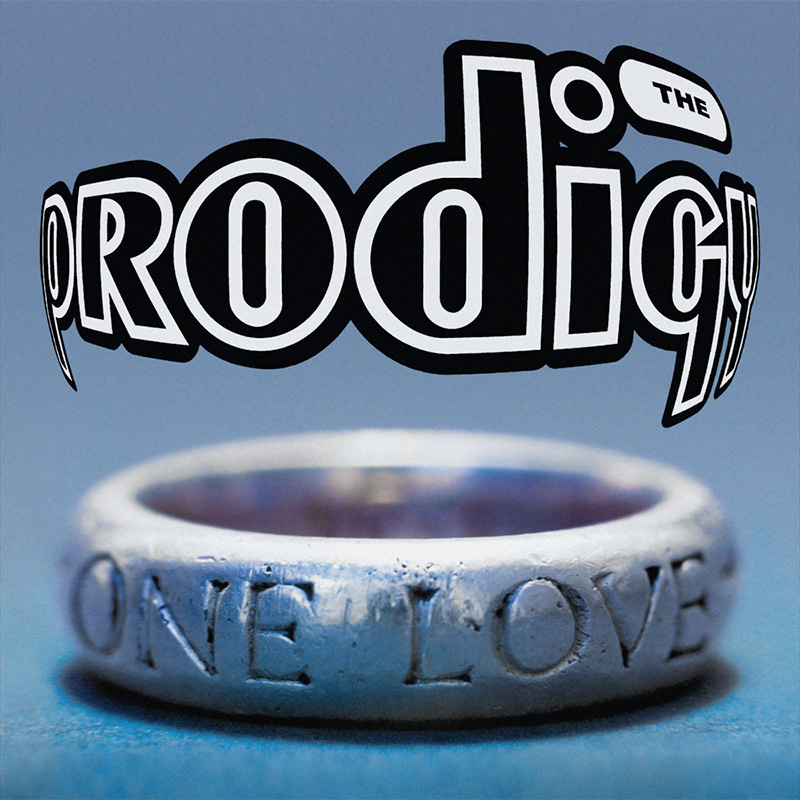
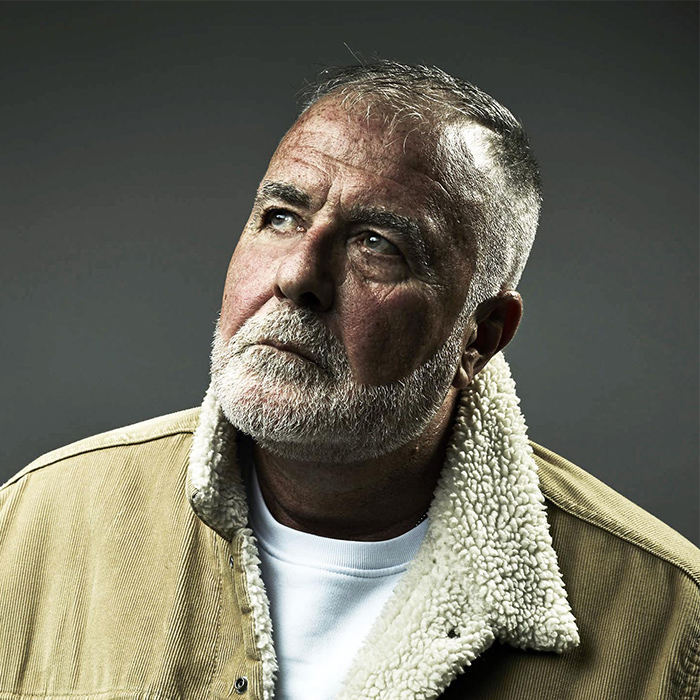
Photo credit: Jude Edgington
The original shot was taken by British photographer James Fry — among the others, he worked with The Prodigy, Oasis, Public Enemy, Saint Etienne, Gary Numan, Supergrass, and a wealth of respected DJs across the last 30 years. “I got sent the ring with the One Love inscription on it. It was kind of like «Your mission today Mr. Fry… is to create a cover out of this», very simple and direct” — he recalls in interview to All Souvenirs. Someday he just got a piece of blue cardboard and shot everything at his place: “I photographed it all in my living room in Kilburn on a Saturday morning in my pyjamas. The light was coming right through the front window. After then I blew it up, then blew it up again and it looked majestic, grainy, and natural”.
Headmaster: SIXSHOT, SPLIT
Additional thanks to: Martin Roach, James Fry, Danny Kara & Etienne Lebon

SBER/QIWI (RUS): 8950008190б
:format(jpeg):mode_rgb():quality(90)/discogs-images/R-142669-1243122308.jpeg.jpg)
:format(jpeg):mode_rgb():quality(90)/discogs-images/R-143209-1243122394.jpeg.jpg)

The truth is , all this nonsense about promo Earthbound “all major djs picking it up” looks like bullshit. If you’ll check the tracklists for 93 sets by many various djs (in house and rave scene) – “One Love” is rarely played, most likely, played as usual as other Prodigy tracks in UK.
Nothing special, but the default “blah blah blah” by Liam and his surroundings just to show how they cool in the underground scene.
Maybe… Anyway, i think it was done just for better promotion their forthcomin single.
Also they already played ‘One Love’ in their live gigs from May of 1993 and maybe early – https://youtu.be/Z0Brp06WX04?t=3177
Yes, was no internet then, but UK music community i think knew in August what is ‘Earthbound’.
I found the secret. Nice work!